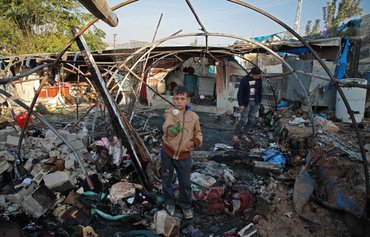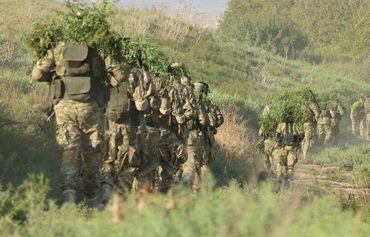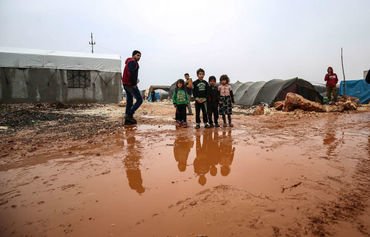Abu Mahmoud thought he and his family had found relative safety from Syria's war, but then rocket fire pounded their camp in the night, killing 16 civilians.
On Thursday morning (November 21st), his brother's tent lay in cinders amid the neat rows of white dwellings of the Qah camp for the displaced near the Turkish border.
Little remained but its metal outer frame after the deadly strike that hit it on Wednesday night.
"We heard a huge blast after the evening prayer," said Abu Mahmoud, wearing a faded winter jacket and a knitted grey hat on his head.
![A man sits inside a damaged tent following November 21st Syrian regime strikes on a makeshift camp in the village of Qah near the Turkish border that killed 15 civilians, including six children, and wounded around 40 others. [Omar Haj Kadour/AFP]](/cnmi_di/images/2019/11/22/21064-syria-bomb-tent-600_384.jpg)
A man sits inside a damaged tent following November 21st Syrian regime strikes on a makeshift camp in the village of Qah near the Turkish border that killed 15 civilians, including six children, and wounded around 40 others. [Omar Haj Kadour/AFP]
"I rushed to check on my brother's tent and found it on fire."
His sister-in-law and her daughter were killed in the blaze, though his brother survived with burns and shrapnel wounds, he said.
Eight children and six women were among those slain in regime rocket fire on the camp, the Syrian Observatory for Human Rights said.
The UN said the bombardment damaged a nearby maternity hospital.
Idlib activist Haisam al-Idlibi told Diyaruna that Iran-backed forces, stationed in Jabal Azzan in the countryside of Aleppo, targeted the camp with rockets loaded with cluster bombs.
"The bombs sparked fires that left many internally displaced people with serious burns and burned a large portion of the tents and modest supplies inside them," he said.
The attack rendered the camp "uninhabitable" despite attempts by White Helmets firefighters to put out the fires before they could spread to the entire camp, he said.
No longer safe
At the site of the bombardment inside the camp, a gas canister sat on a bed of dusty clothing. A wooden door barely held on its hinges.
Outside, Abu Mahmoud's elderly mother clutched a surviving sibling, 18-month-old Aisha, bloody scars etched across the soft skin of her face.
Abu Mahmoud said nothing like this had happened in years.
"We felt some kind of security here, but now this area is threatened too," he said, referring to a zone along the Turkish border generally thought to be safe from bombardment.
Ruled by extremist alliance Tahrir al-Sham since the start of the year, the Idlib region is one of the last parts of the country to escape the control of the Damascus government.
The region on Turkey's doorstep is home to some three million people, around half of whom have been displaced from other parts of the country by Syria's eight-year war.
It has repeatedly been the target of bombardment by the regime and its Russian ally, with the most recent spike in violence from May to August killing 1,000 civilians and displacing 400,000 people.
Many of those forced out of their homes fled north towards the Turkish border.
In the village of Qah, near the camp, Abu Mohammed showed off the large green casing of a missile that fell on a tractor outside his home.
"We were up at home when suddenly something exploded in the sky," the bearded man told AFP, wearing a long black robe and embroidered scarf on his head.
"When I came out, all I could see what this missile near the wall."
'Children, not terrorists'
A UN spokesman on Thursday called for an investigation of the incident.
"This horrific incident needs to be fully investigated," Mark Cutts said.
"These camps are places where people who have already fled violence seek safety and shelter," he said.
The US on Thursday strongly condemned the attack on the camp.
"This horrific incident follows a well-documented pattern of vicious attacks on civilians and infrastructure by the Assad regime, with Russian and Iranian support," Department of State spokeswoman Morgan Ortagus said.
After years of failed UN-backed peace talks to end Syria's war, regime ally Russia and opposition backer Turkey have spearheaded a parallel track of negotiations.
Several agreements on the Idlib region have failed to stem the bloodshed.
But a Russia-announced ceasefire has largely held since late August, with the exception of sporadic bombardment and clashes -- until now, in areas south of Qah.
Another camp resident, also named Abu Mohammed, said the bombardment shattered a popular belief that areas along the Turkish frontier were relatively safe.
"This area, safe? Where is the safe area they speak of?" he raged.
"Leave us alone. These are children, not terrorists."

![A man touches a fragment of a ground-to-ground missile fired by Syrian regime forces that hit a makeshift camp in the village of Qah near the Turkish border in Idlib province on November 21st. [Omar Haj Kadour/AFP]](/cnmi_di/images/2019/11/22/21063-syria-missile-war-600_384.jpg)






